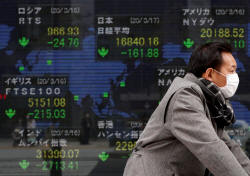Stocks run out of steam on regulation worries, higher
yields
 Send a link to a friend
Send a link to a friend
 [October 27, 2021] By
Karin Strohecker [October 27, 2021] By
Karin Strohecker
LONDON (Reuters) - A flare up in U.S.-China
tensions, signs of further regulatory crackdowns from Beijing and a rise
in short-dated U.S. Treasury yields doused the equity market rally on
Wednesday, offsetting tailwinds from forecast-beating earnings on Wall
Street.
MSCI's global equity benchmark is hovering close to Monday's seven-week
high and is on track for the best month in almost a year.
However, European stocks softened, led by a 1.6% drop in mining and
resource firms. Bank shares also slipped, with Deutsche Bank down more
than 5% despite forecast-beating earnings .
The losses started earlier in Asia, where tech stocks suffered hefty
falls after China's internet watchdog said it planned stricter
registration rules for younger net users. [.HK]
U.S. futures also turned negative as the chipper mood over Tuesday's
forecast-beating results from Google owner Alphabet Inc and Microsoft
Corp started to wane.
"We have good U.S. data in earnings which is very reassuring but
valuation is very stretched in both the value as well as the growth
sector," said Sebastien Galy, senior macro strategist at Nordea Asset
Management.
"And people are also getting a bit hesitant and are a bit worried
because the amount of money that is going through will slow down with
the Fed slowly starting to taper - but that is not necessarily a bad
thing."

Earnings reports from Ford, Coca-Cola, McDonald's and Boeing are due
later in the day.
Concern over more tension between Beijing and Washington weighed on
markets too, after the U.S. Federal Communications Commission voted to
revoke the authorization for China Telecom's U.S. subsidiary to operate
in the United States after nearly two decades, citing national security.
Currency and bond traders were looking to a slew of central bank
meetings over the coming week for guidance.
Canada is first up at 1400 GMT on Wednesday while the European Central
Bank meets on Thursday, when the Bank of Japan also concludes its
two-day meeting.
No changes are expected from Tokyo, but traders are expecting the ECB to
push back on market inflation forecasts and are looking for hawkish
clues from the Bank of Canada as prices put pressure on rates.
Policymakers are facing a steady drip of evidence that there is no
let-up from pressure on consumer prices.
The latest came from Australia, where data showed core inflation hit a
six-year high last quarter, raising the possibility of
sooner-than-planned rate increases.
[to top of second column] |

A man wearing a protective face mask following an outbreak of the
coronavirus disease (COVID-19) walks past a screen displaying the
world's markets indices outside a brokerage in Tokyo, Japan, March
17, 2020. REUTERS/Issei Kato

The Australian dollar jumped after the data but soon pared the gains.
The ebbing risk sentiment meanwhile pushed up the safe-haven Japanese yen which
rose 0.4% against the U.S. dollar though the greenback in turn held just off a
one-week high versus a currency basket.
In fixed income markets, focus was on U.S. short-term Treasury yields which
broke briefly above the 0.5% mark for the first time in 19 months. That caused
the Treasury yield curve to flatten, as the possible timing of the Fed's first
interest rate rise came into tighter focus.
The Fed has all but confirmed it will soon start to whittle back its asset
purchases, though has said that shouldn't signal that rate hikes are imminent.
Nevertheless, Fed funds futures are priced for a lift-off in the second half of
next year.
"We updated our Fed call to show a hike in Q4 2022 and four hikes in 2023,"
analysts at NatWest said in a note.
"The inflation overshoot has been persistent," they said. "There is (only) so
much the Fed can tolerate before reacting ... it feels inevitable that that
conversation will be brought up more and more as we go into next year."
(GRAPHIC: Treasury curve flattens -
https://fingfx.thomsonreuters.com/
gfx/mkt/
mopanjrwqva/Pasted%20image%201635323292640.png)
Traders are also watching for the half-yearly update on UK public finances and
economic outlook from the finance minister, who is expected to set out tighter
budget plans and put Britain on course to become the first big economy to
undergo a two-pronged withdrawal of fiscal and monetary stimulus.
Sterling was down 0.3%, trading at its weakest in over a week ahead of the
announcement.
In commodity markets, oil futures fell more than $1 per barrel after industry
data showed crude stockpiles rose more than expected and fuel inventories
unexpectedly increased last week in the United States, the world's largest oil
consumer. [O/R]
(Reporting by Karin Strohecker, additional reporting by Tom Westbrook; editing
by Sujata Rao, Robert Birsel, Kirsten Donovan)
[© 2021 Thomson Reuters. All rights
reserved.] Copyright 2021 Reuters. All rights reserved. This material may not be published,
broadcast, rewritten or redistributed.
Thompson Reuters is solely responsible for this content.
 |